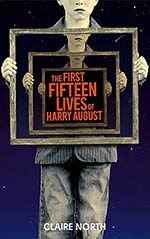
![]() bazhsw
bazhsw
4/3/2016
![]()
I am in a difficult place with this book as I have read it straight after Kate Atkinson's 'Life After Life' - a book that has an almost identical premise. Comparing the books has helped me to understand what it is that I like about the book. Therefore, while I will be largely spoiler-free in this review I will be inevitably be comparing both books to each other hence, if you're thinking of reading the Atkinson book you may choose to 'look away now'.
The set-up is as follows, when Harry August dies he lives his life again. He is born to the same family, in the same circumstances. The difference is that once he reaches about the age of four or five he retains all the memories and accumulated knowledge of his previous lives. Therefore if he dies aged 75 in his first life, by the time he is 5 in his second life he can be considered an 80 year old in a 5 year old's body. (In 'Life After Life' the protagonist Ursula Todd restarts her life each time she dies and events and circumstances throughout her life change which leads to her living longer or having a change - positive or detrimental to her life. However it is clear Ursula only retains fragments or feelings of past lives - more of a feeling of deja vu than a fully experienced reliving.)
I liked the book. I liked it more than 'Life After Life'. Harry August has agency. There is purpose to each of his lives. It's much more explicit. Early on in the novel there is a notion that something is 'wrong' and Harry, as the novel's protagonist is here to make things happen. I never got that in 'Life After Life'. In that book, although Ursula changed events it never felt she had agency. Rather, things happened to her. Atkinson's book felt much more like historical fiction whereas this one doesn't. That's neither criticism or praise but I think reflects the feeling that the events in 'Life After Life' happened to Ursula in the past whereas events happen to Harry August now - whether the now is during World War II, the swinging sixties or the 1920's. '...Harry August' jumps about a fair bit so one never feels they are reading historical fiction - indeed the various historical settings are all in the background. The book is about Harry, not history.
Now I think Atkinson is a much more 'literary' writer (and I mean that as a compliment) and a criticism of 'Life After Life' is that it was repetitive, '...Harry August' suffers in the pacing. At times it feels a slog to get through (maybe that is in part due to the faithful reader reading very similar books back to back!).
I have read reviews stating that 'Harry' is an uninteresting character. I found him pretty cool. I liked the idea of him reliving his lives, sometimes excelling and learning, sometimes largely messing around and playing through lives. It did make me ponder what I'd do if I lived again, it's quite a nice thought, thinking about what choices you'd make and how you'd do things differently. However, it also filled me with loneliness and not a small part of a sadness realising if I lived my life again I'd likely never meet my wife again and I wouldn't have my children yet I'd never forget them...
That's what I really like about the book - Harry never loses his humanity, despite being several hundred years old he is capable of love, fear, compassion and anger. He has the whole gamut of emotions.
There is a plot to the book and around the halfway part this kicks in becoming quite the thriller across timelines and lives. There is a really messed-up relationship which somehow manages to combine deep friendship and love, professional companionship and horrible excesses of cruelty and wickedness. Pretty dysfunctional to be honest.
There is a nice sci-fi novel in here too and I don't think the science goes over the readers head. This is in contrast to Atkinson's novel in that it doesn't pitch well as a sci-fi novel.
Thought provoking with a strong finish.